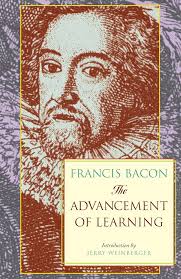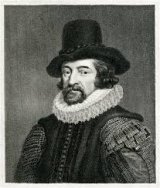The Advancement of Learning Page #34
The Advancement of Learning, published by Francis Bacon in 1605, is a foundational text in the history of science and philosophy. In this work, Bacon advocates for empirical research and the systematic organization of knowledge, laying the groundwork for the scientific method. The book critiques existing scholarly practices and proposes a new approach to learning based on observation and experimentation. It marks a significant shift towards modern scientific inquiry.
- Year:
- 1605
- 1,168 Views
Submitted by acronimous on August 11, 2024
Modified by acronimous on August 11, 2024
alterations and demonstrations, the opinions of Xenophanes; and any other worthy to be admitted. (6) Thus have we now dealt with two of the three beams of man’s knowledge; that is radius directus, which is referred to nature, radius refractus, which is referred to God, and cannot report truly because of the inequality of the medium. There resteth radius reflexus, whereby man beholdeth and contemplateth himself. IX. (1) We come therefore now to that knowledge whereunto the ancient oracle directeth us, which is the knowledge of ourselves; which deserveth the more accurate handling, by how much it toucheth us more nearly. This knowledge, as it is the end and term of natural philosophy in the intention of man, so notwithstanding it is but a portion of natural philosophy in the continent of Nature. And generally let this be a rule, that all partitions of knowledges be accepted rather for lines and veins than for sections and separations; and that the continuance and entireness of knowledge be preserved. For the contrary hereof hath made particular sciences to become barren, shallow, and erroneous, while they have not been nourished and maintained from the common fountain. So we see Cicero, the orator, complained of Socrates and his school, that he was the first that separated philosophy and rhetoric; whereupon rhetoric became an empty and verbal art. So we may see that the opinion of Copernicus, touching the rotation of the earth, which astronomy itself cannot correct, because it is not repugnant to any of the phenomena, yet natural philosophy may correct. So we see also that the science of medicine if it be destituted and forsaken by natural philosophy, it is not much better than an empirical practice. With this reservation, therefore, we proceed to human philosophy or humanity, which hath two parts: the one considereth man segregate or distributively, the other congregate or in society; so as human philosophy is either simple and particular, or conjugate and civil. Humanity particular consisteth of the same parts whereof man consisteth: that is, of knowledges which respect the body, and of knowledges that respect the mind. But before we distribute so far, it is good to constitute. For I do take the consideration in general, and at large, of human nature to be fit to be emancipate and made a knowledge by itself, not so much in regard of those delightful and elegant discourses which have been made of the dignity of man, of his miseries, of his state and life, and the like adjuncts of his common and undivided nature; but chiefly in regard of the knowledge concerning the sympathies and concordances between the mind and body, which being mixed cannot be properly assigned to the sciences of either. (2) This knowledge hath two branches: for as all leagues and amities consist of mutual intelligence and mutual offices, so this league of mind and body hath these two parts: how the one discloseth the other, and how the one worketh upon the other; discovery and impression. The former of these hath begotten two arts, both of prediction or prenotion; whereof the one is honoured with the inquiry of Aristotle, and the other of Hippocrates. And although they have of later time been used to be coupled with superstitions and fantastical arts, yet being purged and restored to their true state, they have both of them a solid ground in Nature, and a profitable use in life. The first is physiognomy, which discovereth the disposition of the mind by the lineaments of the body. The second is the exposition of natural dreams, which discovereth the state of the body by the imaginations of the mind. In the former of these I note a deficience. For Aristotle hath very ingeniously and diligently handled the factures of the body, but not the gestures of the body, which are no less comprehensible by art, and of greater use and advantage. For the lineaments of the body do disclose the disposition and inclination of the mind in general; but the motions of the countenance and parts do not only so, but do further disclose the present humour and state of the mind and will. For as your majesty saith most aptly and elegantly, “As the tongue speaketh to the ear so the gesture speaketh to the eye.” And, therefore, a number of subtle persons, whose eyes do dwell upon the faces and fashions of men, do well know the advantage of this observation, as being most part of their ability; neither can it be denied, but that it is a great discovery of dissimulations, and a great direction in business. (3) The latter branch, touching impression, hath not been collected into art, but hath been handled dispersedly; and it hath the same relation or antistrophe that the former hath. For the consideration is double—either how and how far the humours and affects of the body do alter or work upon the mind, or, again, how and how far the passions or apprehensions of the mind do alter or work upon the body. The former of these hath been inquired and considered as a part and appendix of medicine, but much more as a part of religion or superstition. For the physician prescribeth cures of the mind in frenzies and melancholy passions, and pretendeth also to exhibit medicines to exhilarate the mind, to control the courage, to clarify the wits, to corroborate the memory, and the like; but the scruples and superstitions of diet and other regiment of the body in the sect of the Pythagoreans, in the heresy of the Manichees, and in the law of Mahomet, do exceed. So likewise the ordinances in the ceremonial law, interdicting the eating of the blood and the fat, distinguishing between beasts clean and unclean for meat, are many and strict; nay, the faith itself being clear and serene from all clouds of ceremony, yet retaineth the use of fastlings, abstinences, and other macerations and humiliations of the body, as things real, and not figurative. The root and life of all which prescripts is (besides the ceremony) the consideration of that dependency which the affections of the mind are submitted unto upon the state and disposition of the body. And if any man of weak judgment do conceive that this suffering of the mind from the body doth either question the immortality, or derogate from the sovereignty of the soul, he may be taught, in easy instances, that the infant in the mother’s womb is compatible with the mother, and yet separable; and the most absolute monarch is sometimes led by his servants, and yet without subjection. As for the reciprocal knowledge, which is the operation of the conceits and passions of the mind upon the body, we see all wise physicians, in the prescriptions of their regiments to their patients, do ever consider accidentia animi, as of great force to further or hinder remedies or recoveries: and more specially it is an inquiry of great depth and worth concerning imagination, how and how far
Translation
Translate and read this book in other languages:
Select another language:
- - Select -
- 简体中文 (Chinese - Simplified)
- 繁體中文 (Chinese - Traditional)
- Español (Spanish)
- Esperanto (Esperanto)
- 日本語 (Japanese)
- Português (Portuguese)
- Deutsch (German)
- العربية (Arabic)
- Français (French)
- Русский (Russian)
- ಕನ್ನಡ (Kannada)
- 한국어 (Korean)
- עברית (Hebrew)
- Gaeilge (Irish)
- Українська (Ukrainian)
- اردو (Urdu)
- Magyar (Hungarian)
- मानक हिन्दी (Hindi)
- Indonesia (Indonesian)
- Italiano (Italian)
- தமிழ் (Tamil)
- Türkçe (Turkish)
- తెలుగు (Telugu)
- ภาษาไทย (Thai)
- Tiếng Việt (Vietnamese)
- Čeština (Czech)
- Polski (Polish)
- Bahasa Indonesia (Indonesian)
- Românește (Romanian)
- Nederlands (Dutch)
- Ελληνικά (Greek)
- Latinum (Latin)
- Svenska (Swedish)
- Dansk (Danish)
- Suomi (Finnish)
- فارسی (Persian)
- ייִדיש (Yiddish)
- հայերեն (Armenian)
- Norsk (Norwegian)
- English (English)
Citation
Use the citation below to add this book to your bibliography:
Style:MLAChicagoAPA
"The Advancement of Learning Books." Literature.com. STANDS4 LLC, 2025. Web. 9 Mar. 2025. <https://www.literature.com/book/the_advancement_of_learning_3165>.








Discuss this The Advancement of Learning book with the community:
Report Comment
We're doing our best to make sure our content is useful, accurate and safe.
If by any chance you spot an inappropriate comment while navigating through our website please use this form to let us know, and we'll take care of it shortly.
Attachment
You need to be logged in to favorite.
Log In